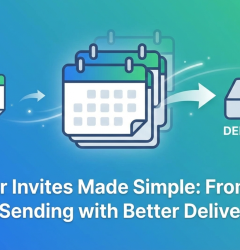- Email: [email protected]
- phone: +44 (0) 203 916 5117
13 May

When organizing an event—whether it’s a conference, webinar, or team meeting—nothing is more crucial than effective communication. Events are planned for months, and canceling one, especially at the last minute, can create confusion, frustration, and disappointment. The last thing you want is to leave your attendees wondering about the status of your event.
As an event organizer, canceling an event comes with a responsibility to communicate that change clearly and professionally. A poorly executed cancellation can negatively impact your reputation and cause unnecessary disruptions.
Thankfully, tools like Let's Calendar can make this process far easier. With Let's Calendar, you can not only send bulk invites but also handle cancellations smoothly and discreetly, ensuring that all invitees are informed in a timely, personal manner.
This blog post will guide you through best practices for communicating an event cancellation and explain how Let's Calendar can streamline this process for you.
Why Clear Communication is Essential for Event Cancellations
When an event is canceled, your attendees deserve to be informed quickly and professionally. If your communication is unclear, it can lead to confusion, frustration, and a poor experience for those involved. Here are the reasons why clear communication is essential:
Maintaining Professionalism and Trust:
Event cancellations are often inevitable due to unforeseen circumstances, but how you handle the situation can have a significant impact on your brand reputation. If you communicate cancellations with empathy, clarity, and professionalism, attendees will respect your transparency, even if the cancellation itself is disappointing.
Avoiding Misunderstandings:
A vague or delayed cancellation notice can lead attendees to show up at the event location or attempt to join a virtual session that no longer exists. By communicating quickly and clearly, you ensure your invitees aren’t left in the dark.
Providing Next Steps:
When canceling an event, always offer a clear explanation and guide attendees on what to expect next. Should they expect a reschedule? Are refunds being processed? Can they expect future invitations? By providing this information upfront, you’ll minimize attendee frustration.
Best Practices for Writing an Event Cancellation Message
When crafting a message to cancel an event, clarity and professionalism are key. Here’s how you can structure your communication:
1. A Clear Subject Line:
Make sure your subject line is straightforward. Example: “Event Canceled: [Event Name].” This immediately informs your recipients of the change and sets the tone for the message.
2. A Polite and Empathetic Introduction:
Start your message by acknowledging the inconvenience caused. For example, “We regret to inform you that [Event Name] has been canceled due to unforeseen circumstances.”
3. Provide a Reason for the Cancellation:
Be transparent about why the event is canceled, especially if it's due to a situation like event cancelled due to weather. Your attendees will appreciate knowing the reason, as long as it is communicated clearly and respectfully.
4. Offer Alternatives or Next Steps:
It’s vital to offer alternatives where possible. If the event is being rescheduled, let your attendees know when and where it will take place. If not, be clear about any refunds or next steps.
5. Contact Information for Questions:
Always provide a way for attendees to reach you if they have additional questions or concerns.
Here’s a sample template:
Subject: Event Canceled: [Event Name]
Dear [Attendee Name],
We regret to inform you that [Event Name] scheduled for [Date] has been canceled due to unforeseen circumstances. We understand the disappointment this may cause and sincerely apologize for the inconvenience.
If the event is rescheduled, we will send you an update with the new date and location. Should you need further assistance or have any questions, please feel free to contact us at [Contact Information].
We appreciate your understanding and hope to welcome you to a future event.
Best regards,
[Your Name]
[Organization Name]
How Let’s Calendar Can Help:
With Let’s Calendar, you can instantly notify all your invitees with a single click. The tool allows for easy event cancellations, and it automatically updates all attendees on their calendar platforms (Google, Outlook, Apple), so there’s no room for confusion.
Handling Event Cancellations Due to External Factors
Sometimes, events are canceled due to unavoidable factors, such as weather. Event cancellations due to weather often happen last minute and can be stressful to manage. Here’s how to handle this:
When to Cancel an Event Due to Weather:
If adverse weather conditions affect the safety of your attendees or the event location, canceling the event may be the only option. For example, if an outdoor conference is threatened by a storm or a virtual event is impacted by widespread power outages, cancellation is sometimes unavoidable.
Communicating Cancellations Due to Weather:
When canceling an event for weather-related reasons, be transparent and empathetic in your message. For instance:
“We regret to inform you that [Event Name] has been canceled due to severe weather conditions in the area. The safety of our attendees is our top priority, and we appreciate your understanding during this unexpected situation.”
Always offer clear next steps—whether the event will be rescheduled or if your attendees should expect a refund.
Using Let’s Calendar for Weather-Related Cancellations:
If your event is canceled due to weather or any external factor, you can use Let’s Calendar to send bulk cancellations, update all attendees discreetly, and offer rescheduling options with minimal effort. The tool’s ability to handle cancellations across platforms, including Google Calendar, Outlook, and Apple Calendar, helps keep your communications timely and professional.
Alternatives to Event Cancellations: Offering Rescheduling Options
In some cases, you may not need to cancel an event outright but simply need to reschedule. Letting your attendees know the event has been rescheduled is just as important as a cancellation notice.
When to Reschedule Instead of Cancel:
Rescheduling may be the best option when the event can still go forward at a later time or date. It’s particularly useful if your attendees are committed to attending, and the event can be salvaged.
How to Communicate Rescheduling:
For rescheduled events, the communication should be clear but positive:
“We are pleased to inform you that [Event Name] has been rescheduled to [New Date and Time]. We hope you are still able to join us for this exciting event!”
Always include a clear call to action: “Please confirm your attendance by updating your calendar through the link below.”
Using Let’s Calendar for Rescheduling:
With Let’s Calendar, you can easily send rescheduled invitations. The system will automatically update all participants’ calendars across multiple platforms, ensuring everyone knows the new date and time. The ability to send personalized invites ensures each attendee gets the most relevant information.
Final Thoughts: Streamlining Event Cancellations
Event cancellations are inevitable at times, but how you communicate these changes can make all the difference. Clear, empathetic, and professional messaging can ensure your attendees feel informed and respected, even in the face of disappointing news.
Using Let’s Calendar can ease the burden of managing cancellations. Whether you need to cancel or reschedule, Let’s Calendar offers a simple and scalable solution, allowing you to send bulk notifications that are personalized, discreet, and updated across all calendar platforms. By doing so, you’ll ensure your attendees are always in the loop, no matter the circumstance.
Conclusion
Effective communication during event cancellations is crucial for maintaining professionalism and trust. Using Let’s Calendar to manage event cancellations ensures that your attendees are kept informed with minimal effort, offering them clear instructions and alternative solutions when possible.
Don’t let event cancellations disrupt your workflow. Let Let’s Calendar streamline the process and keep your attendees engaged—no matter what changes come your way.









Recent Comments